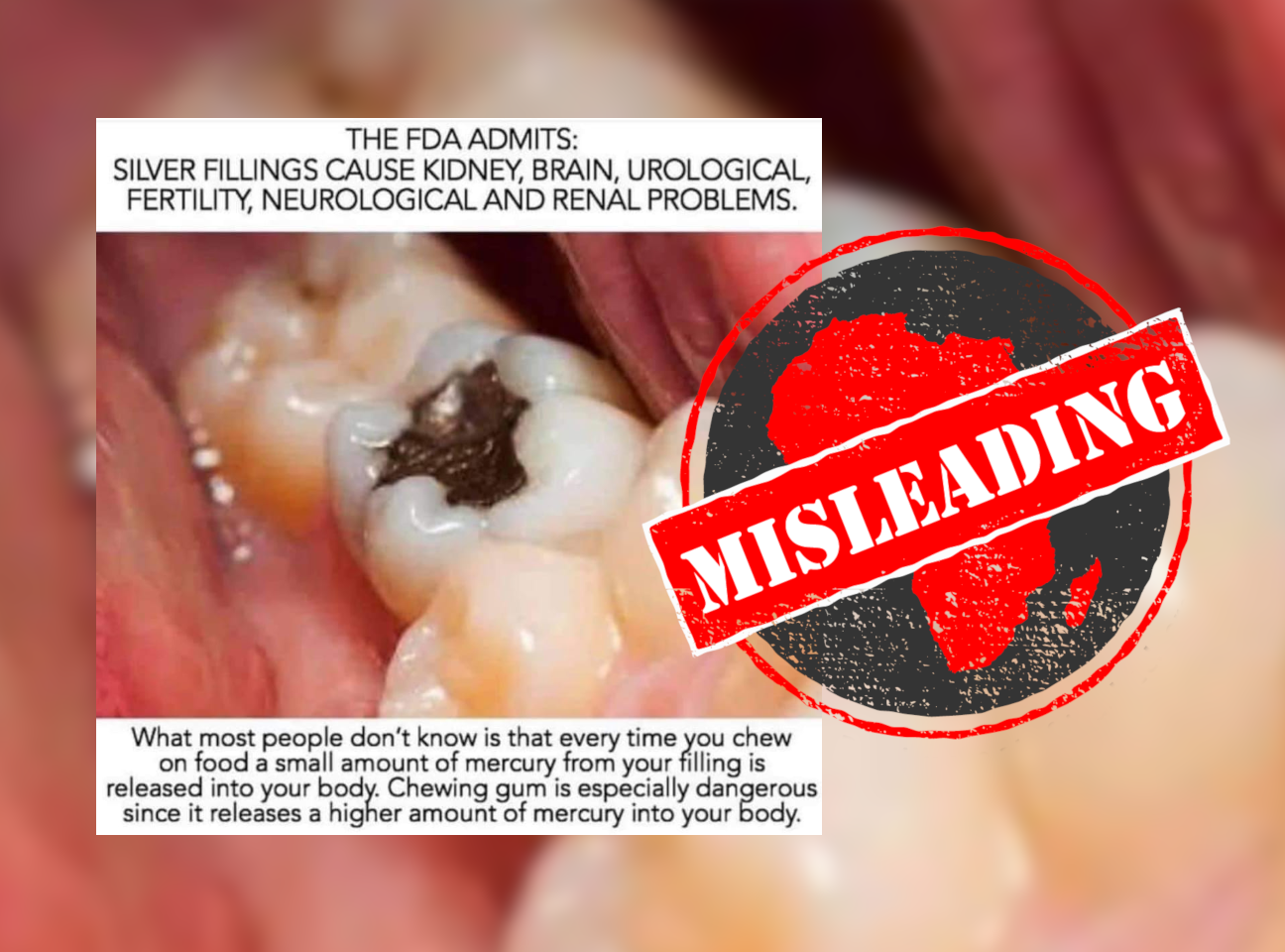IN SHORT: Although the FDA warns that high-risk groups may be more susceptible to the effects of dental amalgam, the agency did not "admit" that silver fillings "cause kidney, brain, urological, fertility, neurological and renal problems".
A graphic viewed over 1,400 times in just 24 hours on Instagram shows a tooth with a silver filling.
Text at the top of the graphic reads: “The FDA admits: silver fillings cause kidney, brain, urological, fertility, neurological and renal problems.” The US Food and Drug Administration, or FDA, is a US federal agency promoting public health.
The graphic continues: “What most people don’t know is that every time you chew on food a small amount of mercury from your filling is released into your body. Chewing gum is especially dangerous since it releases a high amount of mercury into your body.”
Fillings are used by dentists to fill cavities caused by tooth decay, or to repair broken teeth and teeth that have been worn down.
The most common type of filling, according to the UK’s National Health Service (NHS), is called dental amalgam, made from a mixture of metals such as silver, mercury and copper. Other types of fillings include gold and porcelain.
The graphic has also found its way onto Facebook, with the same illustration and words. Some users posted a graphic with a different photo but the same claim.
The NHS warns against “a number of articles on the internet about the alleged toxic properties of amalgam” and says “there is no evidence that exposure to mercury from amalgam fillings has any harmful effects on health”.
But has the FDA “admitted” otherwise and what is the truth behind silver fillings? We reached out to the FDA.

No conclusive evidence of harmful health effects
Shauna Nelson, press officer at FDA, told Africa Check that dental amalgam released small amounts of mercury gas, as a vapour, over time.
The amount of vapour released depended on the number and age of the filling, Nelson said, as well as the habits of each person, such as teeth grinding and gum chewing.
Nelson said that there was no conclusive evidence to show that dental amalgam causes harmful health effects in the general population.
She did warn that certain groups, including pregnant women, nursing mothers and children under the age of six, “may be more susceptible to the effects of exposure to mercury from dental amalgam and may be at greater risk for adverse health effects”.
This list included “people with a known allergy to mercury and people with neurological impairment or kidney dysfunction”, Nelson said.
But what remains uncertain is the potential for the mercury in dental amalgam to turn into other mercury compounds within the body and whether the collection of mercury in certain body fluids and tissues could “result in other unintended health outcomes,” Nelson explained.
The FDA recommends that people who might be at a higher risk for possible adverse health effects should rather use other dental alternatives, such as resins or glass ionomer fillings.
FDA says amalgam fillings are safe for non-high-risk groups
Nelson told Africa Check that the FDA continued to believe that the “benefits of materials in FDA-approved or cleared implantable and insertable medical devices [such as fillings in teeth] outweigh their risks for most patients”.
She referred us to a 2020 report where the FDA found that there had been no increased risk in adverse effects for the general population using dental amalgam.
Nelson recommended that people who experienced any reactions from treatment with amalgam should seek medical care from their dentist or doctor.
“We have published information for the public and recommendations for patients and health care providers, which are informed by our discussions with health care professionals,” she said.
Although the FDA warns that high-risk groups may be more susceptible to the effects of dental amalgam, the agency did not "admit" that silver fillings "cause kidney, brain, urological, fertility, neurological and renal problems". The graphic is misleading.
Republish our content for free
For publishers: what to do if your post is rated false
A fact-checker has rated your Facebook or Instagram post as “false”, “altered”, “partly false” or “missing context”. This could have serious consequences. What do you do?
Click on our guide for the steps you should follow.
Publishers guideAfrica Check teams up with Facebook
Africa Check is a partner in Meta's third-party fact-checking programme to help stop the spread of false information on social media.
The content we rate as “false” will be downgraded on Facebook and Instagram. This means fewer people will see it.
You can also help identify false information on Facebook. This guide explains how.


Add new comment